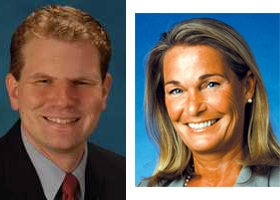Voters in the 25th Congressional District voters will choose between Rep. Dan Maffei, D-DeWitt, and Republican challenger Ann Marie Buerkle in November.
In his bid for a second term, Maffei is stressing Democratic changes from the Bush Administration as an appeal to voters, said his campaign spokesman, Marcus Cerroni. “They do not want to go back to the failed policies of the Bush years of an un-regulated Wall Street and economic policies that benefit only the wealthy,” said Cerroni.
For the Republicans, Buerkle gets praise from the party as a good listener. “Ann Marie will listen to the people, and bring the government back to the people,” said John DeSpirito III, county chairman for the Republican Committee. Because of her conservative views, the party is confident that Buerkle will represent it well, said DeSpirito. “We always pick great candidates,” he said. “But she’s a super-great candidate.”
The 25th Congressional District includes Onondaga and Wayne counties, as well as portions of Monroe and Cayuga counties. The general election is on Nov. 2.
At stake is control of the House of Representatives. All 435 seats are up for re-election. Now, Democrats are the majority, with 258 seats to 177 for Republicans. That gives the Democrats a 41-seat advantage.
But races for 42 seats are open, with no incumbent on the ballot. And many incumbents — for both parties — are endangered by an angry electorate looking for change in politics and government. Many pollsters and political analysts suggest that the Democrats are vulnerable to losing control of the House in the November election.
In New York’s 25 Congressional District around Syracuse, voter enrollment gives the GOP a slight edge. The New York State Board of Elections Web site lists the Democrat’s party enrollment as 137,792 voters and the Republican’s as 138,146 in the 25th Congressional District. The district also has 18,095 voters registered unaffiliated with any party and 7,188 registered Conservative Party members. Combined enrollment in the Green and Working Families parties is under 3,000.
Here is some background on the candidates:
Dan Maffei (incumbent, Democrat)
Maffei, 42, is seeking his second two-year term. In 2008, he defeated longterm incumbent Republican Jim Walsh.
Maffei is a former vice president of a financial services firm, staff member for two Senators, a former TV reporter at WSYR in Syracuse. He has his bachelor’s degree from Brown University and two master’s degrees from Columbia University and from Harvard University’s
John F. Kennedy School of Government.
In his re-election bid, Maffei calls for several tax credits aimed at the middle-class. Among them are tax credits for first-time homebuyers and for college expenses, according to his campaign Web site. He also supports getting rid of taxes on unemployment benefits and closing tax loopholes that allow companies to avoid some taxes on their profits made in overseas operations. The corporate tax-loophole, said spokesman Cerroni, benefits “companies that ship jobs overseas.”
Maffei voted for the national health care overhaul and for an economic stimulus package that Republicans are now targeting for sharp criticism. On his campaign Web site, he defends the vote on the health care overhaul. “It represents a giant step forward in terms of fairness, cost-control, boosting the overall economy and protecting the health of millions of individual citizens,” he says on his Web site.
On the economic stimulus package, he has called it a “compromise” meant to stave off more economic problems.
Ann Marie Burkle (challenger, Republican)
Buerkle, 58, is a former nurse and lawyer.
In her campaign, she’s drawn high-profile national endorsements from Sarah Palin, the former Alaska governor and Republican vice-presidential candidate, and from House Minority Leader John Boehner, R-Ohio.
She has six adult children. She has been a New York state assistant attorney general since 1997.
In her campaign, Buerkle takes traditional Republican stands calling for smaller government and less spending. Her Web site describes her stands this way:
“Government doesn’t create jobs, small businessmen and women do” she says on her Web site. “So it only makes sense that we lower the costs of doing business and let individuals keep more of what they make in order to encourage entrepreneurship, investment, and sustainable economic growth.”
(Heather Duggan is a graduate student in broadcast and digital journalism.)
-30-



